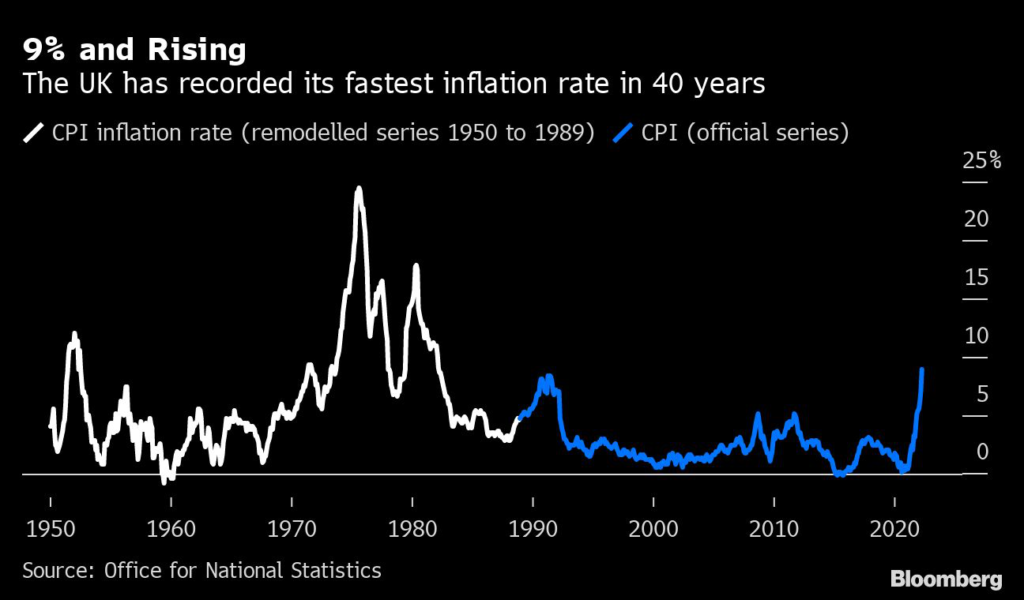(Bloomberg) — UK train services were brought to a near standstill on Tuesday after workers started the country’s biggest rail strike in more than three decades, with union leaders and government at odds over issues such as pay.
A proposal from 13 train operating companies was turned down on Monday, National Union of Rail, Maritime and Transport Workers General Secretary Mick Lynch said in a statement broadcast from near Euston Station, north London. Some 40,000 staff began the walkout from midnight, with further stoppages planned for Thursday and Saturday.
The failure of negotiations means employees at the train firms and track manager Network Rail aren’t at work, while a separate action by 10,000 London Underground staff has hobbled transport within the capital. Only about 20% of national rail services are running, with Scotland and Wales among areas hit hardest.
Although train operators reported quiet stations during the usual morning peak, suggesting most people had found other ways to get to their jobs or were working from home, Transport Minister Grant Shapps said the walkout is “taking us back to the bad old days of union strikes.”
“It’s not acceptable to disrupt businesses that are just getting back on their feet — they are hurting precisely the people they claim to be protecting,” he told Sky News.
Shapps pledged to prepare for any future industrial action should the dispute continue, though measures such as bringing in temporary workers were condemned by the RMT’s Lynch, also on Sky, who said they would not be adequately trained.
“We will go on strike again if we don’t get a settlement to the issues,” he said.
Train operators including Arriva Plc-owned CrossCountry, Avanti West Coast and Great Western Rail all reported a lack of chaos as train users heeded government warnings and stayed at home. A spokesman for Avanti West Coast, majority owned by FirstGroup Plc, said a London-Birmingham train that was in operation Tuesday a.m. filled only 100 of about 600 seats.
Budget Cuts
Lynch blames the government for the crisis, saying the root of the problem is £4 billion ($4.9 billion) of budget cuts — £2 billion each for Transport for London and the national railways.
“That is hobbling this industry and it’s forcing the companies to implement transport austerity and massive cuts to our system,” he said. Other grievances include pay that’s not keeping pace with inflation, job cuts and a lack of guarantees against compulsory redundancies.
Shapps had earlier called that analysis a “fundamental misunderstanding,” and said the money missing from the railways budget is down to lower takings from fares after passenger numbers failed to recover to pre-pandemic levels.
Pandemic Hit
Figures released by the Office of Road and Rail on Thursday showed total journeys at only 62% of the pre-pandemic tally in the quarter through March. That’s partly due to changing commuter habits in the wake of coronavirus lockdowns, with more people continuing to work from home.
Prime Minister Boris Johnson said in a statement late on Monday that “too high demands on pay will also make it incredibly difficult to bring to an end the current challenges facing families around the world with rising costs of living.”
Johnson’s ministers have suggested that restraint on pay rises is needed to rein in inflation, which is already at a four-decade high. Johnson was expected to tell the cabinet on Tuesday that his government seeks to enforce pay restraint on public sector workers, according to a statement from his office.
Shapps said the strikes are “orchestrated by some of the best-paid union barons representing some of the better-paid workers in this country.” He said the median wages of train drivers are well above salaries of nurses and other professions.
Yet the RMT argues that many of the strikers are among the lowest paid on the railway networks, including cleaners. The union representing most train drivers, ASLEF, is not joining the national strike.
Labour’s transport spokeswoman Louise Haigh accused Shapps of “washing his hands” of responsibility. “On the eve of the biggest rail dispute in a generation taking place on his watch, he has still not lifted a finger to resolve it,” she said.
More stories like this are available on bloomberg.com
©2022 Bloomberg L.P.











